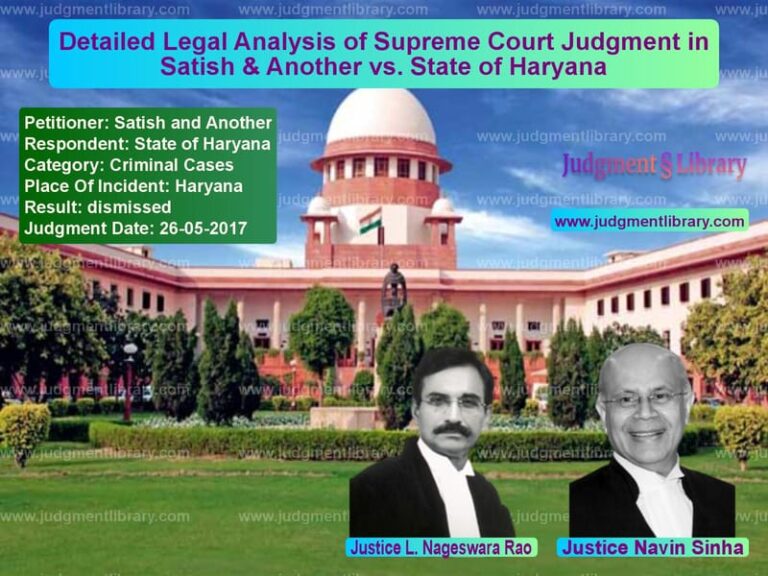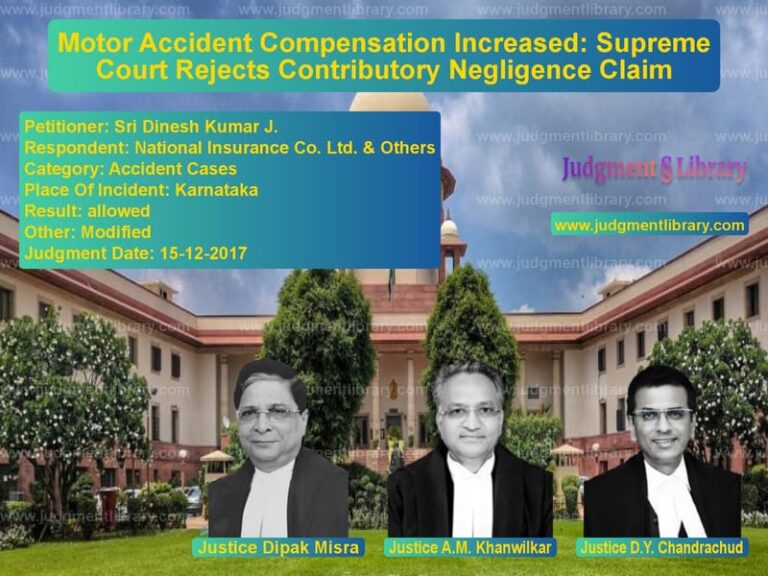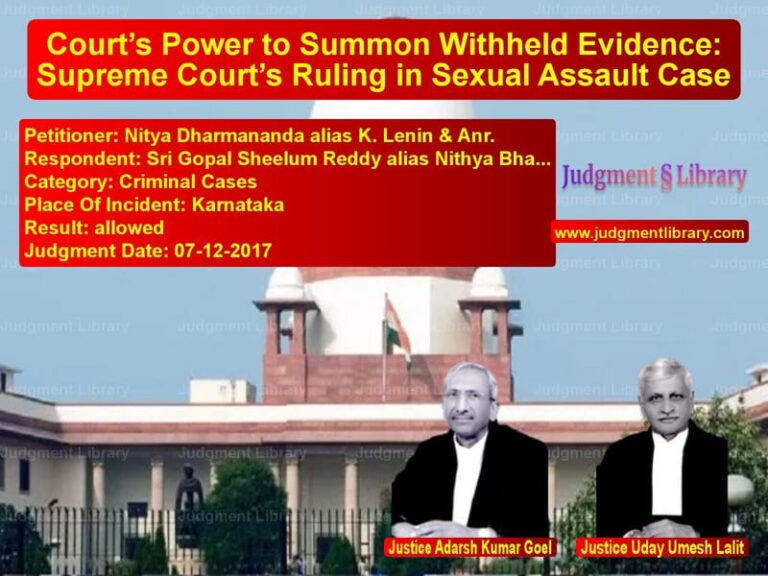Supreme Court Rules on Ownership Dispute and Family Settlement Validity
The Supreme Court of India, in the case of Ravinder Kaur Grewal & Ors. vs. Manjit Kaur & Ors., adjudicated an intricate property dispute involving the interpretation of a family settlement and adverse possession claims. The ruling significantly impacted the legal understanding of family settlements, the necessity for registration of such documents, and the doctrine of adverse possession.
The dispute originated from a family settlement among three brothers concerning a property measuring 11 kanals and 17 marlas, with constructions including 16 shops, a samadhi, and a service station. The plaintiff, Harbans Singh, claimed exclusive ownership based on a family settlement agreement executed on March 10, 1988. The defendants, his brothers, contested this claim, arguing that the property remained jointly owned.
Background of the Case
The property in dispute was initially purchased in 1970, following which disagreements arose among the brothers. Harbans Singh contended that a family settlement had occurred, granting him exclusive ownership. A memorandum of the settlement was later executed in 1988.
Key legal questions before the Court included:
- Whether the memorandum of family settlement required registration.
- Whether the plaintiff had become the owner through adverse possession.
- Whether the second appellate court had erred in reversing the lower court’s findings.
Arguments of the Petitioner
The appellants, representing the heirs of Harbans Singh, contended:
- The memorandum of family settlement was merely a record of a prior oral settlement and did not require registration.
- Harbans Singh had been in open and exclusive possession of the property for over 12 years, thereby acquiring ownership through adverse possession.
- The High Court’s judgment reversing the findings of the lower appellate court was erroneous as it failed to appreciate the factual and legal aspects of the case.
Arguments of the Respondent
The respondents, representing the heirs of Mohan Singh and Sohan Singh, argued:
- The memorandum of family settlement created new rights in immovable property and, therefore, required registration.
- The plaintiff did not have an antecedent title to the property, making the settlement invalid.
- Possession of the property was permissive and could not be considered adverse.
Supreme Court’s Key Findings
1. Validity of the Family Settlement
The Supreme Court reaffirmed the principle that a memorandum of a family settlement is merely a record of a prior oral arrangement and does not require registration. It held:
“Where a family settlement has been acted upon and the terms of settlement have been implemented, the requirement of registration does not arise.”
2. Ownership through Adverse Possession
The Court addressed the alternative plea of adverse possession and clarified that a person in permissive possession cannot claim adverse possession. The judgment stated:
“Mere long-term possession does not automatically lead to ownership unless the possession is open, hostile, and continuous against the interest of the lawful owner.”
3. Reversal of the High Court’s Decision
The Supreme Court observed that the High Court had disposed of the case in a casual manner without adequately considering the factual findings of the lower courts. It criticized the High Court for failing to assess the evidence and held that:
“A second appellate court must exercise jurisdiction cautiously and should not interfere with findings of fact unless there is a substantial legal error.”
Final Judgment
The Supreme Court:
- Allowed the appeal and set aside the High Court’s ruling.
- Restored the judgment of the first appellate court, recognizing the validity of the family settlement.
- Held that the plaintiff’s ownership was legally established based on the family settlement.
Key Takeaways from the Judgment
- Family settlements that merely record prior oral agreements do not require registration.
- Adverse possession claims require clear proof of hostile and continuous possession against the true owner.
- A second appellate court must exercise restraint and respect the factual findings of lower courts.
- Ownership disputes in family property require a careful assessment of documentary and circumstantial evidence.
Conclusion
The Supreme Court’s decision in this case reinforces the sanctity of family settlements and sets a precedent for ownership claims based on long-standing possession. It highlights the importance of procedural adherence in appellate courts and ensures that property disputes are resolved in accordance with settled legal principles.
Petitioner Name: Ravinder Kaur Grewal & Ors..Respondent Name: Manjit Kaur & Ors..Judgment By: Justice A.M. Khanwilkar, Justice Dinesh Maheshwari.Place Of Incident: Sangrur, Punjab.Judgment Date: 31-07-2020.
Don’t miss out on the full details! Download the complete judgment in PDF format below and gain valuable insights instantly!
Download Judgment: Ravinder Kaur Grewal vs Manjit Kaur & Ors. Supreme Court of India Judgment Dated 31-07-2020.pdf
Direct Downlaod Judgment: Direct downlaod this Judgment
See all petitions in Property Disputes
See all petitions in Succession and Wills
See all petitions in Landlord-Tenant Disputes
See all petitions in Judgment by A M Khanwilkar
See all petitions in Judgment by Dinesh Maheshwari
See all petitions in allowed
See all petitions in supreme court of India judgments July 2020
See all petitions in 2020 judgments
See all posts in Civil Cases Category
See all allowed petitions in Civil Cases Category
See all Dismissed petitions in Civil Cases Category
See all partially allowed petitions in Civil Cases Category







